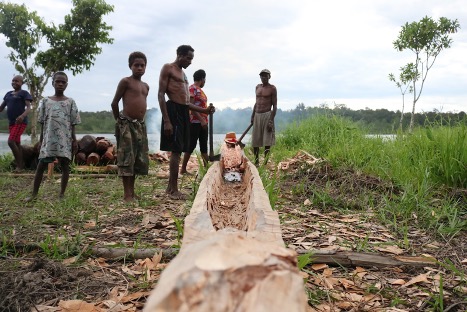News
Background
The Asmat Regency is one of four regencies in South Papua, an Indonesian province with abundant natural resources, among them tropical forest ecosystems, fisheries, mining, and inland aquatic ecosystems. Natural resource management and economic development are some of the key challenges facing the region and are often assumed to be in opposition to each other.
CSF Peru visited the facilities of the National Forest and Wildlife Service (SERFOR) to discuss the potential of building a common agenda where CSF's experience contributes with information that values the forest and wildlife heritage, estimates the cost of the loss of ecosystem services and its socio-environmental impact on the country. The meeting was attended by the Executive Director of SERFOR, Erasmo Otárola, officials of the entity and Augusto Mulanovich Diez-Canseco, director of CSF Peru.
Call for Applications
Training of Trainers (ToT)
Bandung, 5 - 9 August 2024
YAYASAN STRATEGI KONSERVASI INDONESIA / CSF INDONESIA
In the heart of West Borneo lies Sintang Regency, a region deeply committed to sustainable development and the protection of its precious ecosystems for the welfare of its people. With the invaluable support of various Conservation Non-Governmental Organizations (CSOs) like WWF-Indonesia, Sintang Fresh-Water Care, and Alam Kapuas Raya, the local government has taken significant steps to safeguard its natural treasures.
Memorandum of Understanding signing ceremony with The Halu Oleo University, Kendari.
PlanaFlor is a national plan for sustainable development that promotes environmental, economic, and social assets to pursue the effective implementation of the Brazilian Forest Code, Law no. 12.651/12, which provides protection for the native vegetation.
As part of Borneo Island, Sintang is blessed with its primary rainforest and vast biodiversity. The fertile soil of this beautiful island has become a livelihood staple for the Sintang people, however, it is under a great threat. Agricultural deforestation has created imbalance within the ecosystem, and must be addressed with an ecological and economic sustainability approach.
O Brasil é um dos maiores consumidores de agrotóxicos do mundo. De acordo com dados fornecidos pelo Instituto Brasileiro do Ambiente e dos Recursos Naturais Renováveis (IBAMA), o consumo de agrotóxicos no Brasil está aumentando rapidamente com cerca de 162.000 toneladas de agrotóxicos utilizados em 2000, em comparação com as cerca de 549.000 toneladas utilizadas em 2018.
Brazil is one of the largest consumers of pesticides in the world. In fact, according to data provided by the Brazilian Institute of the Environment and Renewable Natural Resources (IBAMA), Brazil’s consumption of pesticides is rapidly increasing with roughly 162,000 tons of pesticides used in 2000 compared to the roughly 549,000 tons used in 2018.
This past September, Conservation Strategy Fund partnered with the Cerrado Institute (Instiuto Cerrados) to host a virtual seminar in Brazil on the economic and social implications of increased pesticide use in farming practices in the Brazilian Cerrado. Because of the increased use of harmful pesticides in farming along with reduced government regulation and oversight, local communities across Brazil have struggled with the associated health risks and resulting environmental damage.









